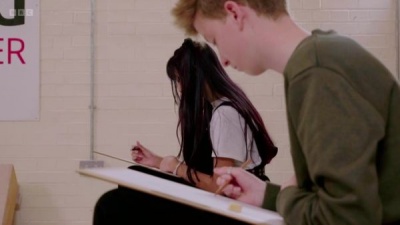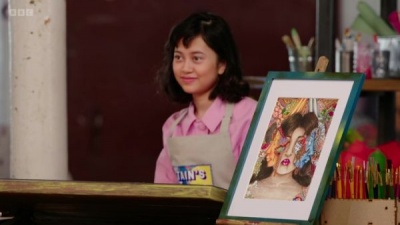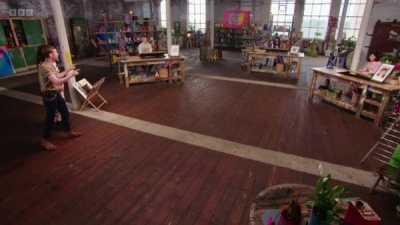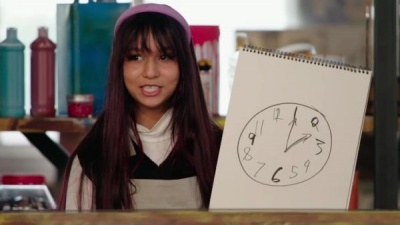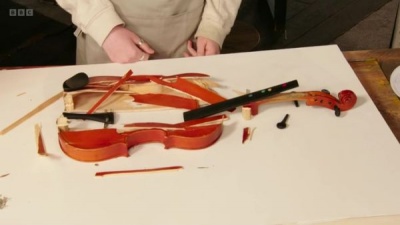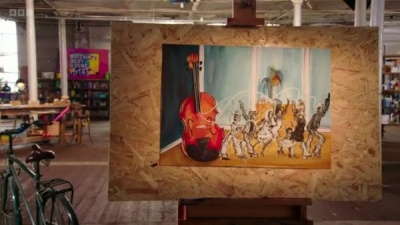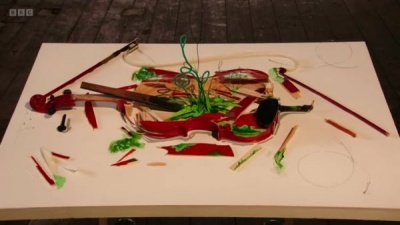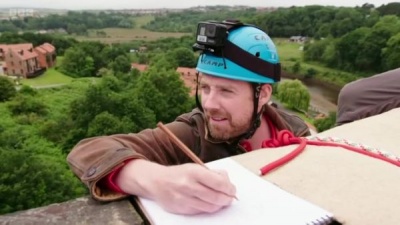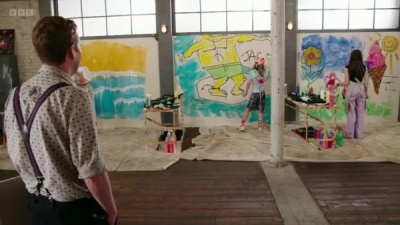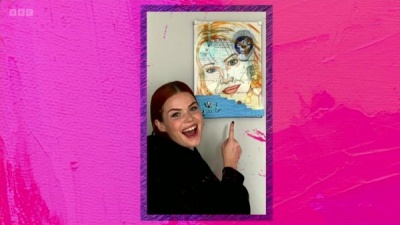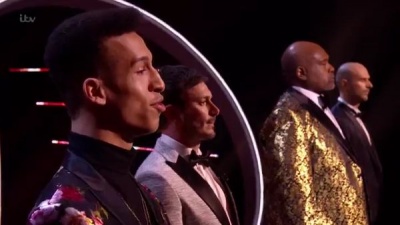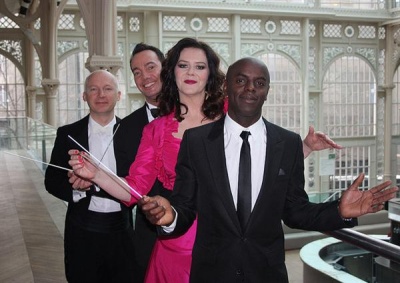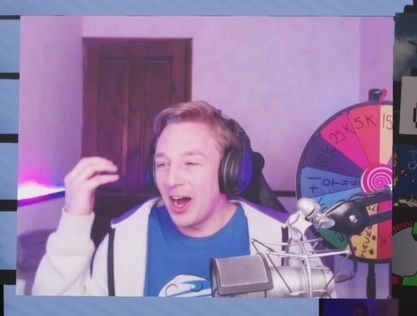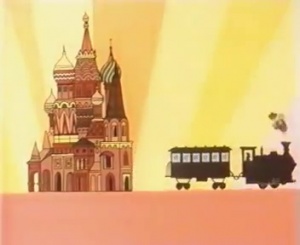Weaver's Week 2022-03-06
Last week | Weaver's Week Index | Next week
Let's put another feather in our hat, lap, and map.
Contents |
Best Young Artist
BBC Children's Productions for CBBC, 7 – 25 February
The format of Best Young Artist is not complex. A group of young artists are set challenges. The best in each heat progresses through the series, heading to the semis and the grand final. Winner of the final is the Best Young Artist.
By "artist", we mean someone who draws or paints or sketches. Someone who makes visual art. We're not referring to "musicians" as "artists", that deliberate confusion is left to The Hit List.
Each of the heats showcases a different style of art – we had cartoons, we had collages, there was street art. We had landscape and portrait editions on consecutive days. It makes the show easier to judge, and easier for the viewer to appreciate – we're comparing apples with apples, or still life pictures with still life pictures.
And this column must confess to a personal problem: we don't understand how to do art. Blame our art master Hendricks, he had very fixed ideas about how art should be done, and literally had no time for those who didn't understand his vision, still less we who wanted him to bother to explain it. For the first time in forever, this naivete has a benefit – we can watch Best Young Artist more like a CBBC viewer, open to improving ourselves, looking for something we can pick up and try ourselves.
As always in talent shows, part of the show is about the competitors, their achievement and their personal growth. Best Young Artist allows the young people to introduce themselves, both through a film and through a self-portrait. And there's a warm-up exercise, each artist has a very short time to draw a clock, or decorate a wall, or something like that.
Everything's set in The Art Studio, a large open space where the youngsters will draw and paint and collage. Except it's not: after the warm-up gives us a chance to see everyone's style, we get a flashback to the "Inspiration Day". For one episode, we heard how music sounds in a reverb chamber, a room with very bare walls and reflective panels on the ceiling so it comes from every direction. And then how the same piece sounds in an anechoic chamber, one with padded walls so there are no echoes. Both are disorienting chambers, and both give the artists an opportunity to sketch.
Throughout, we hear recollections from the youngsters, and there's a short session afterwards where they discuss their art with each other and with the hosts Vick Hope and Ricky Wilson.
And then we're back in the room. Specifically, we're back in the art studio. The artists have 90 minutes to finish their art. They've already had sketches from the Inspiration Day, and taken some time in the days since to work on their ideas.
While the contestants are busy with their art, we viewers are whisked away to the deliberation area. Vick and Ricky have been joined by a guest judge, and we hear what they're looking for in today's brief. What makes a good cartoon? How do we recognise great modern art?
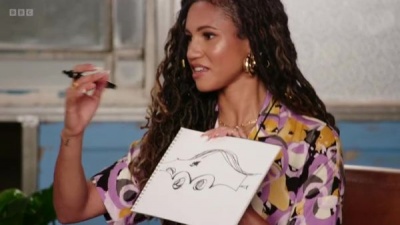 Vick Hope sketches a speeding car.
Vick Hope sketches a speeding car.
It quickly becomes clear that Vick Hope is here as a familiar face, someone the CBBC audience can identify with. They might know her from Radio 1, or backstage at I'm a Celebrity, the older viewers might remember her from Strictly Come Dancing 2018. Vick knows little about art, unlike her co-host Ricky Wilson.
Ricky's another familiar face to CBBC viewers, the host of shortform creative show Art Jam. He's one of those famous people who is happy to lark about on Saturday Mash-Up or grace The One Show. The oldest viewers might remember him from The Voice, and viewers' parents will remember Ricky from his band Kaiser Chiefs. Ricky, and the day's guest judge, will decide the winner.
About halfway through the main challenge, and we have a quick catch up with the artists. How are they getting on, what problems are they facing?
And again, we move away from the competitors, and back to the grown-ups in the building. "Go make some art" encourages those of us who are less good at art to give it a go. Someone sets a challenge, loosely based on the day's theme, and everyone – Ricky and Vick and the guest – has a short while to make some art. They quickly compare their works, explaining why it meets the bill.
And though it's not part of the competition, this little challenge amongst the adults sets the tone perfectly. Everyone's contribution is valid and appreciated, and praised where possible. The tone is celebratory, we're not going to hear the judge tear down Vick's contribution just because her flower looks like a spaceship. All of the emphasis is on what the presenters have actually achieved, and there's no mention of what they've not done.
Why is this important? Artists are their own worst critics. Imposter syndrome, insecurity, lack of confidence, don't quite appreciate what they've achieved. Across the series, we saw all of these negative emotions come from the competitors. Artists know what they want to achieve, and are frustrated that they've not been able to achieve it as time expires. When a contestant says they're "relieved it's all over", we wonder if the producers are filling their duty of care; when we watch carefully, we see that yes, the producers are good, the contestant is cranky through exhaustion.
This column has very little ability with drawing and painting, and we were constantly amazed by everyone's pieces. The judges – who are better at art than us – chose to bring out the best bits, something in the artwork that really stood out as excellent. The way the artist drew the light, or the interpretation of the particular brief.
Best Young Artist is consistent: no negative judgements anywhere. The warm-up exercise, the work they do in the inspiration day, it'll be shared and explored but not critiqued. The formal judging is to sort the great from the even better.
And so we find out who's won the episode. That person comes back in the semi-finals. Best Young Artist has the same structure as Radio 4's Counterpoint, 27 competitors, 9 heats, winner goes to the semis, three winners in the final. Counterpoint stretches its legs over three months, Best Young Artist completed itself in three weeks. If we weren't inspired by tonight's art form, there's another one on tomorrow. And we don't have to remember people from Christmas to Lent, it's just a fortnight from first heat to the semis.
Some slight changes of emphasis for the semis: we see clips of the contenders in their heat, reminded of their winning work. And the show grabs a bit of stardust, inviting some actually famous people to commission the work, and pick one for others to see. Two proper celebrities – racing driver Jamie Chadwick, Blue Peter legend Lindsey Russell – and Dr Alex George representing the Royal National Health Service as much as himself.
Across the course of the series, we're introduced to some very different styles of art. Painting with a spraycan, that's art. Cartoons, mixed media, fan art – all valid. The rotating sound this column hears? Hendricks, turning in his grave. We meet a baker's dozen of art professionals, offering their perspectives, sharing their experience. We think, "hmm, that could be fun to do. How much is a pack of felt tips and a pad of paper anyway?"
The series final challenged our artists to make something about their home town. If we were being particularly snarky, we'll mutter about "people of somewhere" and how this is a choice with political overtones – especially when it's set by the chairman of the British Council, an arm of the current government. But it gave the artists an excuse to take a masterclass in their local gallery, see some of their work projected on the walls, and get one-on-one tuition from a professional artmaker.
Ultimately, viewers will assess a talent competition on whether they agree with the result. Specifically, can we understand why the judges put this piece through? There were many occasions where Best Young Artist gave a different result from the one we'd have chosen ourselves: the series winner would not have made it through the heat or the semi-final if this column were judging. But do we understand where the judges are coming from? Yes. Yes, we do. We're comfortable with the result, we can see the merit and quality in the candidate's work.
Watch more
The whole series (.uk only, free registration required)
Speed art: draw a cake in 15 seconds
A literal highlight: sketching at 37 metres due up
Best bits from the first week
Will we be keeping an eye out for the contestants? Of course we will. We'll cheer them on, hope one day to say "ah, we knew 'em Before They Were Famous". Are we inspired to leave a stone on Hendricks' grave and pick up some art of our own? We just might be. And if this column is inspired, the target audience certainly will be.
What's opera, Doc?
Some very hard stares in the usually sedate world of Quizzy Monday. Richard Osman, host of House of Games (3), had a brainguff:
Yes, Richard. There are many longer, more fruitless ways to spend time.
- When it was clear nobody on The Vault knew the answer, but they had to go through the whole charade before moving on to the viewer quiz.
- The moment before your bus arrives, and the displays says "1 minute" during which day turns to twilight turns to night.
- Any mass debate about the viewing figures of spoof news channels Cheebeebies and Really Tiresome.
- The endless wait to "build tension" before declaring the winner / eliminee on every blimmin' talent show ever.
- Pointless rounds on cities and/or elements, where we're guessing which of "berkilium", "californium", and "illudium" scores the least.
- The baggage retrieval system they've got at Heathrow.
No, the opera round is not the worst part of any television show. It's not even the most useless part of University Challenge.
By design, UC is meant to test all sorts of knowledge. By restricting itself to just one music set per show, we might argue that it's not actually asking enough questions about opera, or classical music, or baroque, or sufi, or klezmer, or bhangra, or a zillion other sorts of culturally-relevant music.
Originally, opera was written to entertain the rich, the elite, the nobility... the 1% of the renaissance era. Public theatres opened during the 17th century, so art – including opera – had to start to appeal to the masses. By the late 18th century, opera was a quotidian entertainment, Mozart was as popular as any contemporary pop star.
After the French revolution, the aristocrats would no longer sponsor theatres, as they were more concerned with keeping their heads connected to their necks. Opera moved downmarket, so much so that a critic in 1832 fumed how there were proper classical musicians, and there was Rossini.
But in the anglosphere, the public couldn't be bothered to learn foreign languages. They still can't. Why should we be bothered to listen to music in Italian or German, when we could be listening to the complex lyric of newcomers Gilbert and Sullivan, or established songwriters like The Status Quo. Opera got its highbrow reputation because it's sung in foreign.
Nevertheless, there is a long history of classical music in popular culture. Think of "Nessun dorma" at the football; think of ITV's two-season success Popstar to Operastar. Think of early editions of ISIHAC featuring the teams singing ordinary texts in the style of grand opera: who can forget Barry and Graeme's "O sole fritter" as they sang Mrs. Beaton's Cookbook as an opera libretto. Think of how 8.5% of music radio listening is to classical music stations.
And the question-setters always try to give the teams and viewers an extra way in – they reference pieces used in movies, or video games. It's rare for the music round to be a complete blank, the teams can generally scrape at least one correct answer. Viewers can learn something, if they choose to.
Let us spare a moment for the viewer: specifically, the opera buff who will get three chances per series to shine? Are we to deny them their minutes in the sun?
So, no. We disagree with Richard Osman. We'll keep the occasional opera round on UC. In fact, let's go further. We challenge Richard to include an opera aria (just the one!) on "Win When They're Singing".
In other news
Congratulations to Ash the Bash, who spent last Saturday afternoon – and Saturday evening, and a good chunk of Sunday morning – asking 500 Questions. The feat that Giles Coren couldn't, and Richard Quest didn't, has been done by one streamer in a well-lit room. It's the second time young Ash has run this stream, which raised money for the mental health charity Mind.
Special congratulations to Ash's contributor Lew Cario, who – split across two streams – actually answered 500 questions, an incredible feat of knowledge and stamina.
Another episode of TV Show and Tell, with Olivia van der Werff. Beyond Dispute appear in the credits to many shows, but what exactly does an independent adjudicator do?
But wait! There's more! Mr. Show and Mr. Tell also talk with Paul Farrer. He has composed the music for your favourite show. The Wheel! The Weakest Link! The Chase! Some that don't begin with "The"!
C1R/RTR is out of the Eurovision Song Contest. The broadcaster, shown as "Russia" on screen, will not send an entry to Turin. The EBU said that to include the broadcaster would bring the contest into disrepute, as it would appear to endorse the invasion of NTU's territory in Ukraine. The decision followed complaints from Eurovision member broadcasters NPO, YLE, EER, SVT, DR, and NRK – and probably others we didn't hear about.
Subsequent to this decision, Channel 1 Russia and the other members of the RTR – VGTRK and Radio Dom Ostankino – chose to leave the EBU. They'll no longer be able to access content such as sports events, news footage, or cultural programming like Radio 3 Through the Night. It also means they won't be able to return to Eurovision's song contests, and Junior Eurovision without RTR is going to be very different.
Speaking of very different, singers have been announced for the Americanofestivalen, a song contest franchised from Eurovision and more closely based on the SVT qualifiers. Kelly Clarkson and Snoop Dogg will host. Competitors will include Jewel and Macy Gray from The Masked Singer, sometime star Sisqo, and Michael Bolton from BBC4's Top of the Pops For People Who Still Want To Know What Adrian Rose Looked Like.
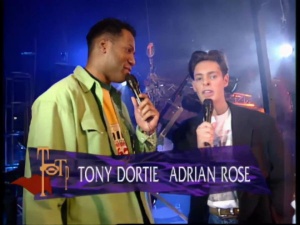 He looked like this, and later worked on Who Wants to be a Millionaire. Happy now?
He looked like this, and later worked on Who Wants to be a Millionaire. Happy now?
The most populous areas seem to have handicapped themselves by sending unknown acts – California send Latina group Sweet Taboo, New York have refrigerator ENISA. Texas have picked Grant Knoche, a dish of grilled dumplings and okra served in an overly-spicy tomato sauce. JESC winners Georgia have gone with Stela Cole, "doo-wop harmonies and hip-hop beats" according to the biog.
Americanofestivalen begins on NBC in the early hours of 22 March, with the winner declared just hours before ESC's semi-final on 10 May.
Nominations are out for the Royal Television Society's Programme Awards. Game shows and people up for the win are:
- House of Games (3) in RTS Daytime Show of the Year
- The Masked Singer and The Big Breakfast, in Entertainment
- Victoria Coren Mitchell of Only Connect (2), in Entertainment Performance
- Mo Gilligan and AJ Odudu of The Big Breakfast, also in Entertainment Performance
- The Rap Game, in Formatted Popular Factual
Winners will be announced on 29 March.
Quizzy Mondays University Challenge saw Edinburgh have an off-day in their winners' quarter-final against Emmanuel: four penalties for incorrect interruptions handed about 70 points to the opposition, and Edinburgh only scraped the win, 150-145.
In the losers' bracket, St John's Cambridge beat Trinity Cambridge by 155-125. Lots of dropped starters in this show, where St John's raced ahead, Trinity almost caught up, then St John's won the closing stanza. Was it a coincidence that there were bonus rounds on 1983 literature and 1981 world events?
Mastermind completed its heats with an empty chair: one contestant had been taken ill just before recording, and they couldn't rustle up a standby contestant to fill the place. Graeme Jackson won with Grace Kelly as the specialist. It's not unprecedented for Mastermind to only have three contenders, the 1972 final featured just three in the chair, these days they have twice as many.
The first semi-final was a high-scoring match. Ian Wang (films of Studio Ghibli) won with 26 points; Lucy Westall (short stories of Daphne du Maurier) made 25. There were 23 apiece for Kit Lane (Scott Pilgrim) and Ranvir Singh Kalare (Formula One since 2010). It's great to see so many correct answers across the show, and it's great that Clive Myrie is able to accelerate when the contestants can cope with it. And it's wonderful to see the contenders able to show off their specialist knowledge.
Finals of The Great Pottery Throw Down and Celebrity Hunted on Channel 4 (Sun). Interior Design Masters moves to BBC1 (Wed). Next Saturday: Dani Harmer on Celebrity Mastermind, soapstars on Pointless Celebrities, and Richard E Grant on Saturday Night Takeaway.
Pictures: BBC Children's Productions, Thames, BBC, Ash the Bash.
To have Weaver's Week emailed to you on publication day, receive our exclusive TV roundup of the game shows in the week ahead, and chat to other ukgameshows.com readers, sign up to our Google Group.


